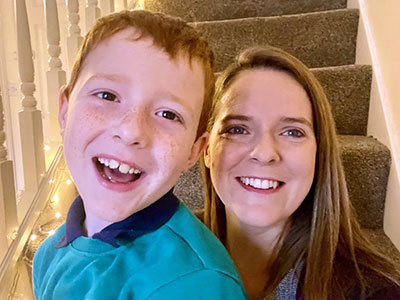Free school meals guidance is being updated because tens of thousands of disabled children miss out.
The UK Government’s move follows an inclusive meals campaign and legal action that highlighted the scale of the problem.

Dani Hunter, who wants “to be treated fairly”, with autistic son Simon
Unable to eat at school
Charity Contact says disabled children miss out because their disability or sensory needs mean they cannot eat in school.
But the disability charity insists the law is clear and children should be offered alternatives, such as supermarket vouchers.
The charity says children with conditions including autism, epilepsy and diabetes lose out on around £570 a year.
It says this drives families into debt and to food banks.
More than 100,000 affected
Ian Byrne, Labour MP for Liverpool West Derby, says the problem affects more than 100,000 disabled children.
Byrne said research shows disabled children’s families are “disproportionately affected by cost-of-living pressures”.
Dani Hunter says her seven-year-old autistic son Simon has food allergies and sensory issues.
She says preparing his lunches costs £25-£30 a week. She has asked for vouchers but is still waiting for a reply.
Hunter says she is only looking “to be treated fairly”.
Reasons for not eating free school meals
Research by Contact found disabled children could not eat their free school meals because of illness, dietary issues or sensory problems.
Others are off school due to illness or a home education package.
Home-educated children are not eligible for a free school meal. In contrast, children with an Education Otherwise Than at School (EOTAS) package are eligible for a free school meal or alternative.
There are about 8,000 children in England with a package of EOTAS. It is different from home education because children with EOTAS are still under the local authority’s care, whereas home-educated children are not. There is no legal entitlement for a local authority or school to provide a free school meal to a home-educated child.
Anna Bird is Contact’s chief executive. She said families should get “all the help they are entitled to without having to fight”.
But after a group of parents took legal action, the UK Government conceded that children who cannot attend school should get free meals.
Campaign and legal action
Mum Natalie Hey started the inclusive meals campaign three years ago when she realised many children missed out.
Hey said following her legal action an “equitable outcome is on the horizon”.
School standards minister Damian Hinds has confirmed the Government will update guidance. He added that it would write to schools to clarify that they can offer alternatives, including vouchers.
He said the updated guidance should give parents “something to point schools to when discussing their child’s needs”.
Related:
Published: 18 January 2024. Updated: 21 February 2024.

















